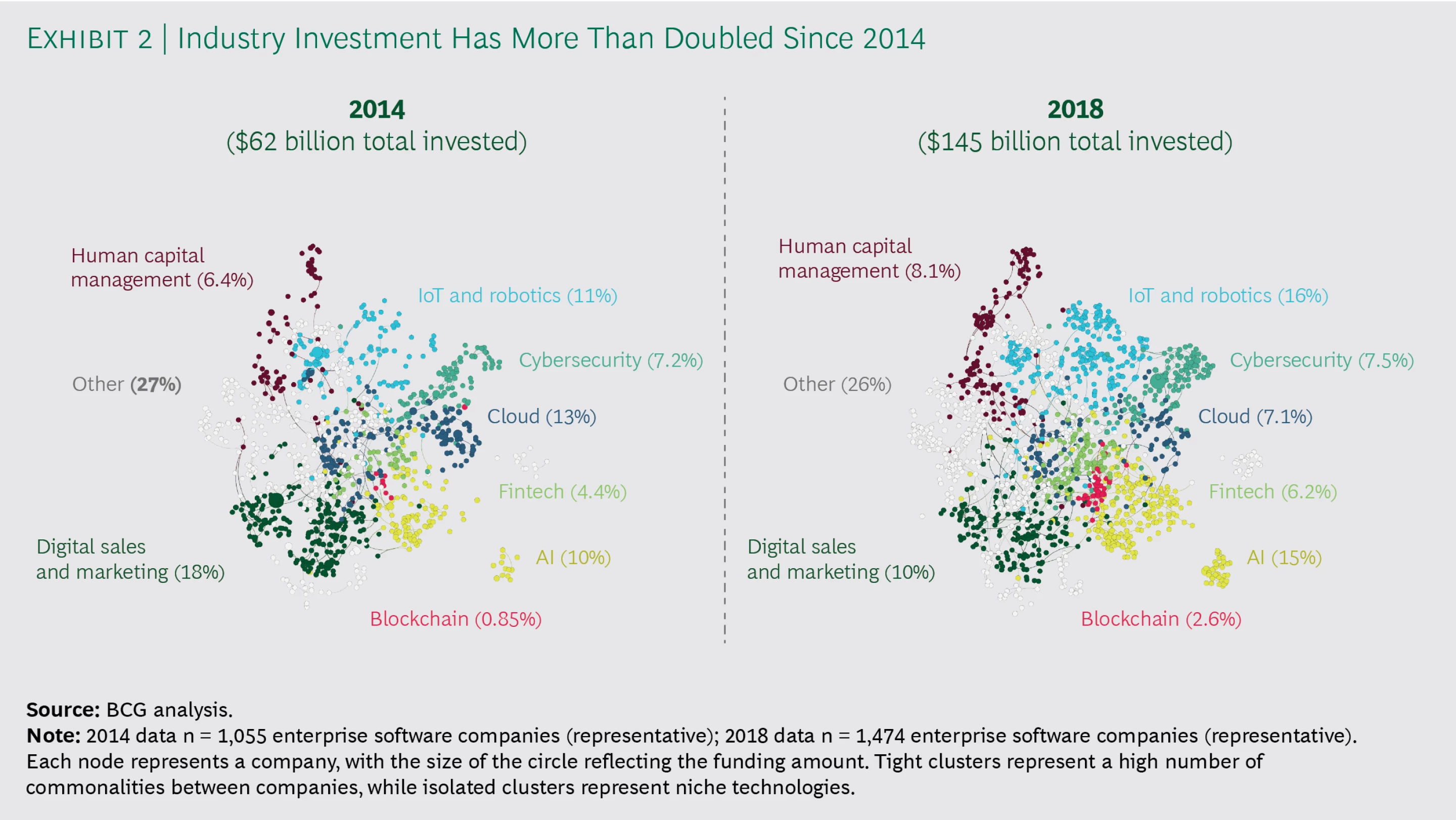The research provides an analysis of business solutions cloud services, regarding innovative offerings, business models, and technology investment. With the dominant position of large cloud vendors, such as AWS, Google and Microsoft, the cloud market is expected to see a rising level of consolidation in the future. Solutions that address client-specific pain points are expected to be opportunities for new market entrants or disruptors.
Innovations in Business Solutions Cloud Services
- The “retail, hospitality, restaurants, telecommunications, healthcare, transportation, marketing, finance, human resources, education, and IT” industries have been in the process of service transformation using cloud solutions. Following the trend of the service economy, cloud technology enables traditional manufacturers to become a service provider. Since the launch of cloud services, such as Apple Pay, iTunes Store, App Store, Apple Music, iCloud and Apple Care, Apple’s service revenue grew 35% quarter on quarter in the second half of 2017 and became the second-largest source of revenue following iPhone. Its service revenue was two times more than AWS and three times as much as that of Netflix.
- Cloud multisided platforms, such as Google, Facebook, Netflix, Microsoft, Amazon, and Alibaba, enable businesses to transform from linear to networked business models. New business models are attributed to service innovation and cloud platforms that enable the business models to establish an ecosystem connecting “platform managers, service providers, users, customers, suppliers, partners, alliances, products, services, complementary resources, and facilitating feedback between the ecosystems’ actors.” This has been part of Microsoft’s service innovation strategy.
- Microsoft cloud service enables oil&gas companies, such as BP, to reduce carbon emission footprint and energy consumption through developing innovative, digital solutions. For its financial service clients, cloud service provides a frictionless experience to their customers and allow investors to quickly and efficiently manage data and gain insights on risk and performance drivers using Azure Data Services. In the telecom space, Microsoft service enables telecom operators, such as SK Telecom in Korea, to offer Xbox’s cloud gaming service to its customers. In the education sector, Microsoft cloud service enhances universities’ capability in remote learning and research. In the retail sector, Microsoft cloud service helps retailers, such as Woolworths, streamline supply chain and improve customer experience by moving mission-critical applications onto the cloud across different channels. Microsoft Azure Arc allows businesses, such as Africa’s Talking, to develop digital tools that help software developers grow.
- AWS partners with PwC to deliver customized cloud solutions that incorporate the technical expertise of PwC’s consulting expertise. The strategic alliance more accurately solves clients’ issues. For example, Prognos, an AI technology vendor, attempts to develop a solution for pharmaceutical companies to understand lab data that is critical to physicians’ decision-making. With strength in innovative, cloud-based technologies, such as analytics, blockchain, virtual reality, and the Internet of Things (IoT), AWS also partners with consulting firms specializing in cloud services, such as Innovative Solutions, to gain a better understanding of clients’ business.
- With increasingly mature, innovative technologies, cloud platform specialists, such as AWS, have started to partner with technology vendors that have complementary AI solutions. For example, AWS partners with Intel and helps Career Launcher, an online education portal, develop virtual classrooms with AI capabilities; the business solution cloud service improves the online learning experience of students during COVID-19 when schools were closed.

- As shown in the chart above, investment in pure cloud technologies declined significantly between 2014 and 2018, regarding its share of investment. From the perspective of business functions, cloud-based business software and service is expected to see a noticeable growth of 10.7% CAGR between 2019 and 2025. Specifically, finance, sales&marketing, human resource, and supply chain solutions are four main segments of the business software and service market. The growth of finance solutions is driven by the demand in the banking, financial services and insurance industry; human resource management solutions are a fast-growing segment, which is widely adopted across industries and integrated into payroll solutions. The growth of sales&marketing solutions is driven by emerging, innovation-driven technologies, such as AI and blockchain. Microsoft, Oracle, Adobe, SAP, Salesforce, and Workday are major technology vendors in the business software and service market.
New Entrants or Disruptors
- Besides cost reduction and efficiency enhancement that is common to generic cloud solutions, disruptors are expected to solve critical issues or pain points of a client or an industry and helps them build sustainable, competitive advantages. While emerging, innovation-driven technologies, such as IoT and AI, create advanced solutions, cloud computing is the creator of innovation and the catalyst of technological advancements.
- AWS, Google Cloud and Microsoft Azure are the three major cloud vendors dominating the cloud market due to their vast scale and resources. Their Platform-as-a-Service (PaaS) solutions are disruptors to Software-as-a-Service (SaaS) vendors. Facing the challenge from increasingly commoditized software on PaaS, SaaS vendors are expected to focus on niche strengths, re-innovate or partner with PaaS vendors. Market consolidation is expected to continue. Moreover, software-enabled services disrupt SaaS solutions, regarding the approach of software development.
- DataStax, a distributed, hybrid cloud solution provider and its cloud service is based on Apache Cassandra, an open-source project. With DataStax, large enterprises in retail/e-commerce, such as eBay, can quickly expand into public cloud storage, enable omnichannel catalogue services, and support a large volume of online search; the solution provides a smooth customer experience. The distributed database architecture and hybrid cloud capability allow financial institutions, such as Allianz, to build real-time BI systems. The solutions solve industry pain points, such as data silos, system downtime, “complex application architecture and rigid data integration, and threats to data security.” The company partners with major cloud platform providers, such as Microsoft, AWS and VMware.
- Innovation Cloud, a SaaS solution provider on innovation management, solves the industry pain point of constantly facing the challenge of shortened product and service life cycle and increased competition. Its Innovation Cloud Enterprise solution helps businesses build an innovation process from idea through to commercialization. This solution also uncovers the creative potential of employees, the source of innovation at any organization.


